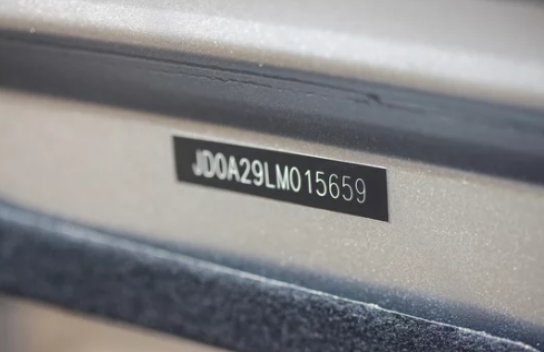Automotive identification, the Vehicle Identification Number (VIN) stands as a fundamental element, unique to every vehicle since its manufacture. This unique code does much more than identify a vehicle; it serves as a key to unlocking a vehicle’s history, specifications, and legal status. Here’s an in-depth look at what a VIN is, why it matters, and how to interpret this automotive “fingerprint.”
Understanding VIN Structure
A VIN is a 17-character code acting as a vehicle’s unique identifier, showing its make, model, and other key details. You can typically find the VIN in these places:
- On the driver’s side interior dashboard, visible through the windshield
- On the driver’s side door jamb
- Under the hood
- On the vehicle’s frame
- Within registration documents
- On title papers
These locations are chosen for easy access and verification.
Why VINs Matter
The importance of a VIN transcends mere identification. For vehicle owners, it is a portal to the car’s history, including past accidents, service records, and ownership changes. Insurance companies rely on VINs to adjust premium prices based on the vehicle’s history and risk factors. Mechanics use the VIN to accurately identify engine types and necessary parts for repairs, ensuring service precision.
Manufacturers track vehicles for recalls and warranty services through VINs, ensuring safety and compliance standards are met. Law enforcement agencies and the Bureau of Motor Vehicles (BMV) utilize VINs to check for stolen vehicles or verify legal ownership and registration, making VINs indispensable in maintaining legal and safety standards in automotive use.
Deciphering the Code
The composition of a VIN can reveal much about your vehicle. The first three digits, known as the World Manufacturer Identifier (WMI), detail the vehicle’s country of origin, manufacturer, and division. The next six digits, or the Vehicle Description Section (VDS), provide specifics about the vehicle model, body type, restraint system, transmission type, and engine code. The final eight digits, the Vehicle Identifier Section (VIS), include information on the vehicle’s production year, assembly plant, and a unique serial number, distinguishing it from other vehicles.
Practical Uses of a VIN
The VIN’s utility spans several practical scenarios. Mechanics refer to the VIN for precise identification of the vehicle model and its specific parts, ensuring repairs and replacements are accurate. Insurance companies use VINs to evaluate the risk associated with insuring a vehicle, potentially adjusting premiums based on the vehicle’s history of accidents or thefts.
For manufacturers, the VIN is crucial for identifying vehicles affected by recalls, facilitating efficient owner notification and rectification of issues. Law enforcement and the BMV leverage the VIN for verifying vehicle legality, ownership, and history, playing a critical role in preventing and solving vehicle-related crimes.
When purchasing a used car, conducting a VIN check is indispensable. This check can reveal a vehicle’s comprehensive history, including any accidents, service history, and previous ownership, allowing buyers to make informed decisions and avoid potential pitfalls.
VINs and Insurance: What You Need to Know
When it comes to insurance, the VIN is not just important; it’s essential. While you might obtain a preliminary quote without a VIN, finalizing your car insurance policy requires this unique identifier. The VIN allows insurers to access detailed information about your vehicle, ensuring the insurance coverage accurately reflects the vehicle’s risk profile. If you’re unable to locate your vehicle’s VIN, companies like Allstate offer alternative methods to quote, although the VIN will ultimately be necessary to purchase the policy.
Conclusion
The VIN is more than just a series of letters and numbers stamped on your vehicle; it’s a comprehensive record of your vehicle’s identity, history, and technical specifications. Understanding your VIN can enhance your automotive experience, from ensuring accurate vehicle services to securing appropriate insurance coverage. It empowers vehicle owners with the knowledge needed to make informed decisions regarding vehicle maintenance, insurance, and purchases.
As we navigate the roads and the paperwork of vehicle ownership, let’s not overlook the value of the VIN. It’s a powerful tool in ensuring our vehicles are properly cared for, legally driven, and appropriately insured. Familiarize yourself with your vehicle’s VIN today—it’s the first step in unlocking a wealth of information that can enhance your ownership experience and safeguard your automotive investment.
purchase, the VIN is your gateway to a wealth of important information. Use it wisely, and let it guide you to informed, confident decisions in your automotive endeavors.
FAQs
Can a VIN tell me if a car is stolen?
Yes, by conducting a VIN check through law enforcement agencies or online databases, you can determine if a vehicle has been reported stolen. This is crucial when purchasing a used vehicle.
Can a VIN change over the life of a vehicle?
No, a VIN is assigned at the time of manufacturing and remains the same throughout the vehicle’s life, ensuring a consistent and reliable way to track and identify the vehicle.
Is it safe to share my vehicle’s VIN?
Yes, sharing your VIN is generally safe. It’s often necessary for vehicle service, insurance processes, and purchasing parts. However, always share it with trusted entities and for legitimate purposes.
Can a VIN reveal a vehicle’s maintenance history?
Yes, various services use the VIN to track a vehicle’s maintenance history, accidents, and repairs, providing a comprehensive overview of the vehicle’s condition over time.
Get a Auto Insurance Quote
Looking for an accurate and honest auto insurance quote? Contact an insurance agency like tutenagency or get a quote online. Call (334) 502-5111 to insure your vehicle today.
Disclaimer: This content is for informational purposes only and should not be considered legal or financial advice. Always consult with qualified professionals in legal and financial fields before making any decisions.

